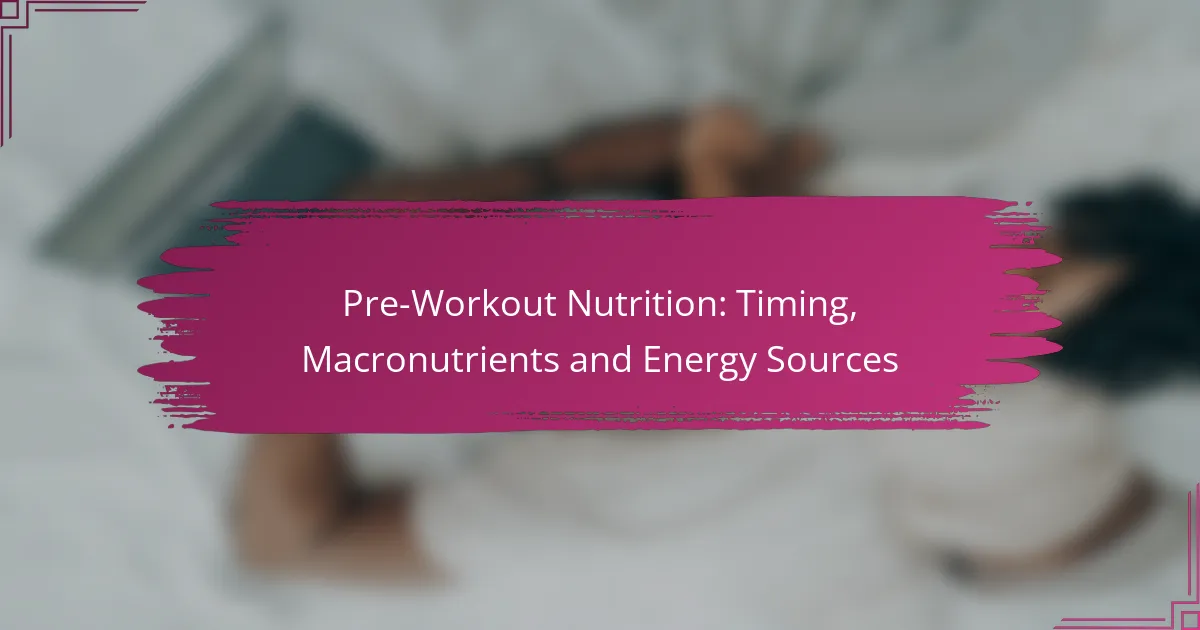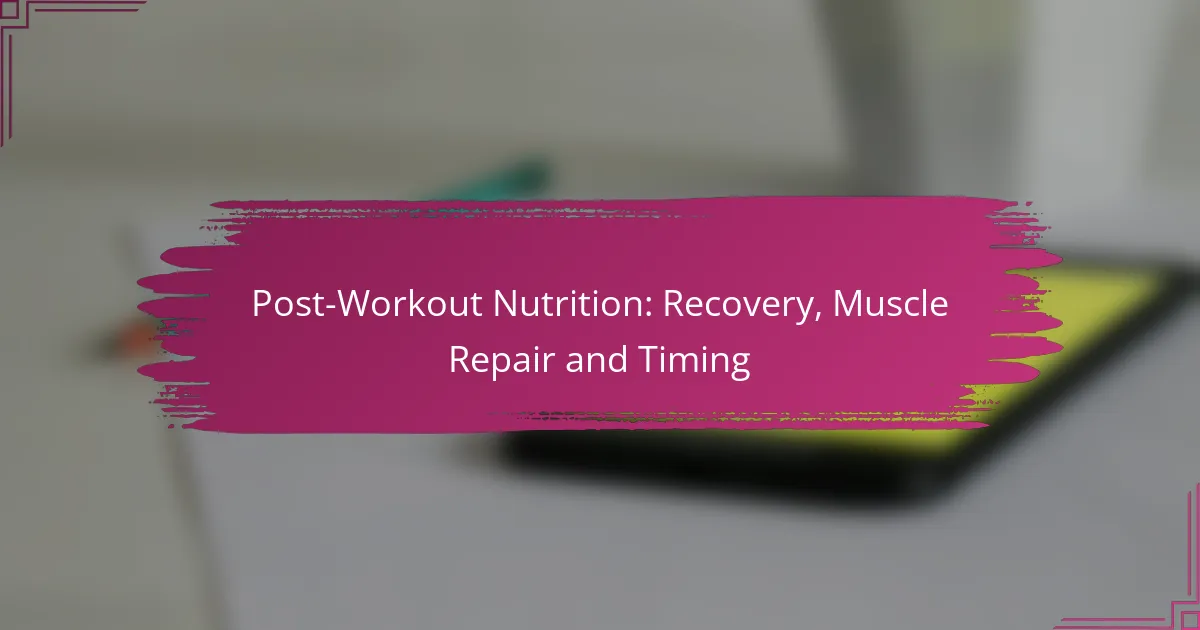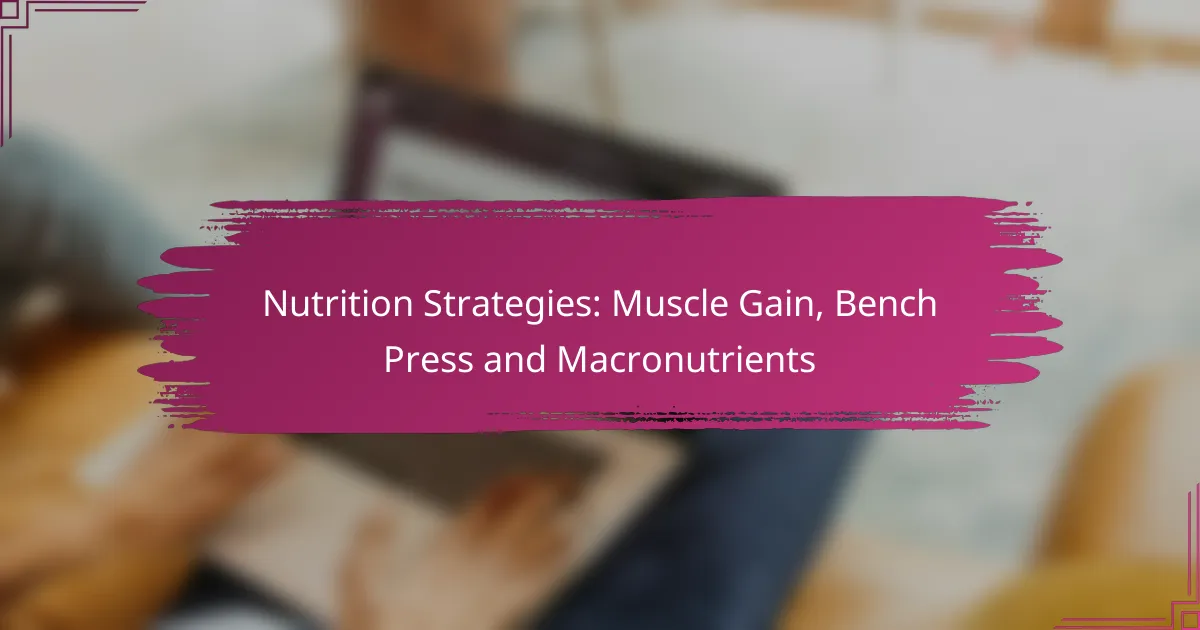Pre-workout nutrition plays a crucial role in enhancing athletic performance by supplying the essential energy and nutrients needed for optimal physical activity. By strategically timing the intake of macronutrients—carbohydrates, proteins, and fats—athletes can improve endurance, strength, and recovery, ultimately leading to more effective training sessions and better results.

How does pre-workout nutrition impact performance?
Pre-workout nutrition significantly influences athletic performance by providing the necessary energy and nutrients to optimize physical activity. Properly timed intake of macronutrients can enhance endurance, strength, and recovery, allowing athletes to train more effectively and achieve better results.
Improved endurance
Consuming carbohydrates before a workout can lead to improved endurance by providing a readily available energy source. Foods rich in complex carbohydrates, such as oats or whole grain bread, can help sustain energy levels during prolonged exercise sessions. Aim for a meal or snack containing 30-60 grams of carbohydrates about 30-60 minutes before your workout for optimal results.
Additionally, including some protein can help stabilize blood sugar levels, further enhancing endurance. A small serving of yogurt or a protein shake can be beneficial in this context.
Enhanced strength
Pre-workout nutrition that includes protein can enhance strength by promoting muscle repair and growth. Consuming around 20-30 grams of protein, such as from chicken, fish, or a protein supplement, about 30-60 minutes before strength training can maximize muscle performance. This timing helps ensure that amino acids are available during the workout.
It’s also essential to include some carbohydrates to fuel the workout. A combination of protein and carbs, like a banana with peanut butter, can provide the necessary energy and support muscle function during high-intensity training.
Faster recovery
Proper pre-workout nutrition can lead to faster recovery post-exercise by reducing muscle soreness and replenishing glycogen stores. Consuming a mix of carbohydrates and protein within 30 minutes after a workout is crucial. Aim for a ratio of 3:1 carbohydrates to protein to effectively aid recovery.
For example, a smoothie made with fruit and protein powder or a turkey sandwich on whole grain bread can be effective recovery options. Staying hydrated is equally important, so ensure adequate fluid intake before, during, and after workouts to support overall recovery.

What macronutrients are essential for pre-workout nutrition?
Pre-workout nutrition primarily involves carbohydrates, proteins, and fats, each serving distinct roles in fueling your workout and supporting recovery. Understanding the importance of these macronutrients can help optimize performance and enhance results.
Carbohydrates for energy
Carbohydrates are the body’s primary energy source during exercise. They are stored as glycogen in muscles and the liver, providing quick energy when needed. Consuming carbohydrates before a workout can improve endurance and performance.
Aim for a carbohydrate intake of about 30-60 grams 30-60 minutes before exercising. Good sources include bananas, oatmeal, or whole-grain bread. Avoid high-fiber foods right before a workout to prevent digestive discomfort.
Proteins for muscle repair
Proteins play a crucial role in muscle repair and growth, making them essential for pre-workout nutrition. Consuming protein before exercise can help reduce muscle damage and promote recovery post-workout.
Consider including 10-20 grams of protein in your pre-workout meal or snack. Options like Greek yogurt, protein shakes, or a handful of nuts can provide the necessary protein without feeling too heavy.
Fats for sustained energy
Fats serve as a secondary energy source, particularly during longer, moderate-intensity workouts. While they are not the primary fuel for high-intensity exercise, healthy fats can help maintain energy levels over extended periods.
Incorporate small amounts of healthy fats, such as avocados, nuts, or olive oil, in your pre-workout meal. However, keep portions moderate, as high-fat meals can take longer to digest and may cause discomfort during exercise.

When should you consume pre-workout nutrition?
Pre-workout nutrition should ideally be consumed about 30 to 60 minutes before exercise to optimize energy levels and performance. This timing allows your body to digest and absorb the nutrients effectively, providing the necessary fuel for your workout.
30-60 minutes before exercise
Consuming a meal or snack 30 to 60 minutes prior to your workout can enhance your energy and endurance. Focus on a combination of carbohydrates and protein, as carbohydrates provide quick energy while protein supports muscle function. A small meal, such as a banana with a scoop of peanut butter or a yogurt with granola, can be effective.
Be cautious with portion sizes; aim for a snack that is around 150 to 300 calories. This range helps prevent discomfort during exercise while still delivering enough energy. Avoid high-fat or high-fiber foods close to your workout, as they can slow digestion and lead to gastrointestinal issues.
Timing based on workout intensity
The timing of your pre-workout nutrition may vary depending on the intensity of your exercise. For high-intensity workouts, consuming your pre-workout meal closer to the 30-minute mark can be beneficial, as your body will need immediate energy. In contrast, for lower-intensity or longer-duration activities, you might opt for a meal 60 minutes prior.
Consider the type of workout you plan to do. For strength training, a snack rich in protein and carbohydrates can help maximize muscle performance. For endurance activities, such as running or cycling, prioritize carbohydrates to sustain energy levels throughout the session. Adjust your intake based on how your body responds to different timings and food types.

What are the best energy sources for pre-workout?
The best energy sources for pre-workout are complex carbohydrates, simple sugars, and electrolyte drinks. These options provide the necessary fuel and hydration to enhance performance and endurance during exercise.
Complex carbohydrates
Complex carbohydrates are a primary energy source that provides sustained energy for workouts. Foods such as whole grains, oats, and brown rice release glucose slowly, helping to maintain energy levels over time.
For optimal results, consume complex carbohydrates about 2-3 hours before exercising. A serving size of 30-60 grams is typically effective, depending on individual energy needs and workout intensity.
Simple sugars
Simple sugars offer a quick energy boost, making them ideal for pre-workout consumption when you need immediate fuel. Foods like bananas, honey, or sports gels can rapidly elevate blood sugar levels, providing a fast source of energy.
These should be consumed about 30-60 minutes before your workout. Aim for 15-30 grams of simple sugars to maximize energy without causing a crash during your session.
Electrolyte drinks
Electrolyte drinks are essential for maintaining hydration and electrolyte balance, especially during intense workouts or in hot conditions. They replenish lost minerals like sodium, potassium, and magnesium, which are crucial for muscle function and endurance.
Consider consuming an electrolyte drink 30 minutes before your workout, especially if you plan to exercise for over an hour. Look for options that contain around 300-600 mg of sodium per liter to effectively support hydration and performance.

How to choose the right pre-workout foods?
Selecting the right pre-workout foods involves considering the timing, macronutrient composition, and energy sources that best support your workout goals. Prioritize easily digestible carbohydrates and moderate protein to fuel your performance while avoiding heavy meals that could lead to discomfort.
Consider workout duration
The duration of your workout significantly influences your pre-workout nutrition choices. For shorter sessions, a small snack with carbohydrates, like a banana or a slice of toast, may suffice. However, for longer workouts exceeding an hour, consider a more substantial meal that includes complex carbohydrates and protein, such as oatmeal with yogurt or a whole grain sandwich.
Timing is also crucial; aim to eat your pre-workout meal about 30 to 90 minutes before exercising. This allows your body enough time to digest and convert the food into usable energy.
Evaluate personal dietary needs
Your individual dietary needs play a vital role in choosing pre-workout foods. Factors such as dietary restrictions, allergies, and personal fitness goals should guide your selections. For instance, if you are vegetarian or vegan, focus on plant-based protein sources like legumes or tofu combined with whole grains for energy.
Additionally, consider your body’s response to different foods. Some individuals may tolerate high-fiber foods well, while others might experience digestive discomfort. Experiment with various options to find what works best for your body and enhances your workout performance.

What are common pre-workout nutrition mistakes?
Common pre-workout nutrition mistakes include consuming too little or too much food, neglecting the right macronutrient balance, and timing meals improperly. These errors can lead to decreased energy levels, impaired performance, and even digestive discomfort during workouts.
Not eating enough carbohydrates
Carbohydrates are a primary energy source for high-intensity workouts. Failing to consume adequate carbs can result in fatigue and reduced stamina. Aim for a meal or snack containing 30-60 grams of carbohydrates about 30-60 minutes before exercising.
Good sources of pre-workout carbohydrates include fruits like bananas, oatmeal, or whole-grain toast. These options provide quick energy without causing digestive issues.
Skipping protein
Protein plays a crucial role in muscle repair and growth, making it essential for pre-workout nutrition. Skipping protein can hinder muscle recovery and performance. Including a moderate amount of protein, around 10-20 grams, can enhance your workout results.
Consider options like Greek yogurt, a protein shake, or a small serving of lean meat to ensure you have enough protein before your workout.
Eating too close to workout time
Consuming food immediately before exercising can lead to discomfort and sluggishness. Ideally, eat your pre-workout meal or snack 30-60 minutes prior to your workout to allow your body time to digest. This timing helps maximize energy availability and minimize gastrointestinal distress.
If you’re short on time, opt for easily digestible snacks like a banana or a small protein bar that can provide energy without weighing you down.
Overloading on fats
While healthy fats are important for overall nutrition, consuming too much fat before a workout can slow digestion and lead to discomfort. It’s best to limit fat intake in pre-workout meals to ensure quick energy availability. Aim for a meal with low to moderate fat content.
Focus on lean protein and carbohydrates, reserving higher-fat foods for post-workout meals when your body can better utilize them for recovery.



